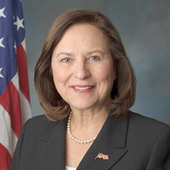Highway Bill: Less bureaucracy, more flexibility
Strengthening our infrastructure has long been an important policy focus of mine. As I travel the state meeting with Nebraskans and visiting their businesses, I am often reminded that roads are the lifeblood of Nebraska that connect our busy cities with sprawling rural communities. A modern infrastructure is key to economic growth, attracting new businesses, and ensuring public safety.
I believe maintaining a strong transportation system is a core duty of a limited government, and as such, it should be a funding priority. In the Nebraska Legislature, I worked to craft L.B. 84, the Build Nebraska Act, which directs a portion of Nebraska's existing sales tax to fund new road construction throughout the state. Now that it's law, we're seeing its positive impact on our roads and highways across Nebraska.
As a U.S. Senator, I'm continuing to work with my colleagues on a bipartisan basis to update our nation's aging highways and apply the successful principles we've used in Nebraska at the federal level. Recently, the Senate Environment and Public Works (EPW) Committee on which I serve unanimously advanced MAP-21, long-term (six year) legislation to improve the nation's federal highway system.
This bill maintains the structure of main highway programs. It authorizes long-term funding and gives state and local governments the certainty and flexibility they need to improve and develop our nation's transportation infrastructure. Throughout my time serving on the EPW Committee and in many meetings with state officials, I have advocated for allowing states increased flexibility by removing overly burdensome federal mandates and requirements that stall progress. I believe this ensures each state can more efficiently use limited resources and target taxpayer funds towards its specific needs.
MAP-21 contains key provisions I worked to include, which will provide more flexibility for states to expedite road projects. I drafted these provisions after meeting with key transportation stakeholders in Nebraska, including officials from cities, counties, and the Nebraska Department of Roads.
First, the bill will provide assistance to states that want to assume responsibility for reviews of categorical exclusions, or CEs. In other words, it allows states to provide their own environmental review of certain projects, rather than wasting time waiting for the federal government to provide the necessary assessments. Second, the bill improves the Programmatic Agreement process for CEs to allow states to determine whether consultation with relevant resource agencies (such as the U.S. Fish and Wildlife Agency, the Historical Society, etc.) is necessary in the first place. The bottom line of both these provisions is more flexibility for states, and a quicker project deployment process. This means lower costs, less red tape, and more common sense.
MAP-21 grants the Transportation Secretary new authority to provide much-needed regulatory relief and flexibility for rural road and rural bridge projects. It accelerates the project delivery process and helps eliminate duplicative environmental reviews.
Transparency and accountability were also key priorities in this bill and remain key priorities of mine. The Transportation Secretary is now required to publicly post on a website all funding data for highway projects. This data will include the time and costs associated with federal environmental regulations so we in Congress can better provide oversight.
I believe this legislation takes another positive step forward by not expanding Interstate tolling. While tolling raises revenue, it is only for the bridges or highways tolled, not for broader infrastructure needs. It does not address the more widespread funding challenges we are facing. I expressed this concern to Transportation Secretary Foxx at a recent committee hearing.
Though the bill must still be considered by the full Senate as part of broader transportation legislation, I am pleased with the bipartisan work of my colleagues to bolster policy at the federal level and support stronger infrastructure in Nebraska and across the country. Enhancing the role of states in these critical projects puts responsibility in the right hands while removing unnecessary bureaucracy to ensure more efficient, cost-effective maintenance of our nation's transportation system.
Thank you for taking part in our democratic process, and I'll visit with you again next week.

